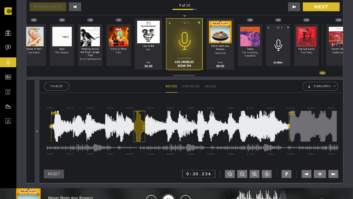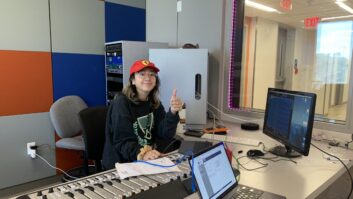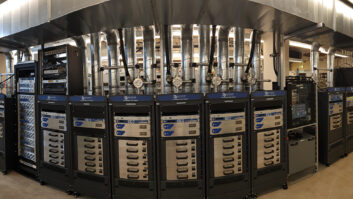
McCoy works knee-deep in wiring pulling out old cable. Standing is Dave Cooke, IT manager in Fayetteville. Beasley Broadcast Group does a great job of highlighting engineers when it salutes outstanding employees each year. More radio groups should single out technical staff members in this way.
Most recently the company, which has 44 stations in 11 markets, made special note of the work of Charlie McCoy.
He oversees the technical infrastructure of Beasley’s Augusta, Ga., cluster, including radio station studios for seven FMs and three AMs, transmitter sites and IT. In the press release, Vice President and Chief Technology Officer Mike Cooney was quoted saying McCoy had really stepped up in a recent lightning strike incident.
I was interested in hearing more so I asked Cooney for details.
“Several months ago, the building or STL tower in Augusta, Ga., sustained a lightning strike that knocked all 10 collocated stations off the air,” Cooney told me by email.
About 25 percent of the cluster’s router was damaged, as were several pieces of studio electronics. That router model is no longer manufactured, and the staff would have needed to send the circuit cards and consoles in for repair or replace them with a new product. The stations had already intended to replace the older router with an IP system, so they ordered two new consoles from Wheatstone and reconfigured the old one to get back on the air temporarily.
Within a day, Charlie McCoy had made the necessary changes to the old router to get all 10 stations back on-air and operating normally. Within about 10 days, he had replaced much of the other damaged studio electronics.
The two new consoles and router showed up at the stations in due course. But Charlie’s work wasn’t done.
TRYING CIRCUMSTANCES
“While the new consoles and router were still in the hallway, waiting for installation, the building took yet another lightning strike. This one was more severe. The first strike caused about $60,000 in damage and the second strike caused at least $150,000 in additional damage,” Cooney continued.
The second bolt destroyed the entire old router, every existing console, eight studio phone systems, two STLs, three Sage EAS units, every satellite receiver, the building phone and security systems and dozens of other studio electronics. It also blew a hole in the roof of the hotel next door and took out much of their electronics.
Lightning is bad like that.
Fortunately, Cooney said, the majority of the BE AudioVault systems were still operating, as were most of the STLs.
McCoy started with the highest-billing station and worked his way through the cluster to start putting the stations back on the air. “Charlie had eight of the stations back on the air within a day,” Cooney said.
The staff immediately ordered more new consoles and routers.
The real work started when the consoles showed up and the team started to remove the dead router and all the cabling. Wheatstone shipped products quickly and sent engineers to help with the installation.
“Dave Cooke, engineer for Beasley’s Fayetteville, N.C., cluster, traveled to Augusta and gave Charlie vital onsite support. I flew into the market to help manage the project, concentrating primarily on making sure this never happened again,” Cooney said.
“Within a week of the second strike, we made major changes to the grounding of the tower, satellite dishes, electrical system and all the studios.”
His work during this “engineer’s nightmare,” Cooney concluded, is why Charlie McCoy was an obvious choice to receive recognition from Beasley at the company’s annual meeting.
“I can’t say enough about what an amazing job Charlie did to get the stations back on the air during both lightning strikes.”
And I can’t say enough about companies that take the time to appreciate the efforts of their engineers and technical staff during trying circumstances.












